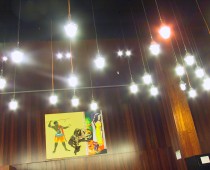My notes from Aspen where I saw a great talk on the psychology of Happiness
Happiness. The most popular class at Yale ever. Professor Santos.
Background movements in psychology
Science of Positive Psychology
Science of Behavior Change
Plan of the class
Science – how it works – of the good life
Practice – experiences to change behavior eg gratitude, sleep, meditation
Outline of the argument
1. You can change your well-being level. It isn’t innate. It isn’t mostly heritable, eg Lyubomersky best-seller. 50%. Control the rest.
2. Life circumstances don’t matter that much. Eg lottery winners. And reverse like injuries. That’s 10%.
3. Rest can be produced by intentional effort: daily work. Like the gym. Avoid the GI Joe Fallacy (“Knowing is half the battle.”) http://thehowofhappiness.com/
4. You mind is often lying about what makes you happy. Visual illusions lie about reality. Etc. Mind illusions about what will make us happy – eg money. 75k is enough per studies. People increase their cash desire increasingly as they have more money.
5. Socializing: Happy people spend more time with others, less time alone. By large margin, 1.5 to 2x. Epley and Schroeder – Connection condition, Solitary condition, Control/Be yourself. Connection happier; no lower productivity.
6. Helping Others. Dunn 2008. Give people money. Make them give it away. Makes them happier.
7. Gratitude ritual. Eg instead of Whinefest do a Celebfest. Or make a daily gratitude list. Express it publicly – through greater social connection. Seligman 2005 – write a letter. The recipient of this message feels a huge positive effect for them. Lasts a month for both parties.
8. Healthy stuff matters more than you think like sleep and exercise. 30 min cardio = Xoloft Rx. Sleep – Dinges 1997 – 7.5 hrs vs 5 hrs — sleep restriction makes mood fall by half from 12 to 6 (clinical depression levels).
9. Being in the present. 49.6% of the time, mind is wandering. Not attending to what we do. Gilbert 2010. As mind wanders it is typically reducing well-being. How to address: Savoring. Meditation (mindful or loving kindness meditation).
10. Become wealthy in time not money. Have free time. Cancelled class; a surprise hour for the students. Take a walk, read a random book, savor a bubble tea, tell me what you did. “First hour off I have ever had.” “An hour they would remember for their whole lives”
To do list – family version vs work version
⁃ Socialize
⁃ Give money away
⁃ Gratitude daily and publicly
⁃ Exercise 30 min
⁃ Sleep 7 hours
⁃ Savor and Meditate in the present
⁃ Time affluence. An hour back. No meetings.
Informal Survey of WellBeing.
National College Mental Health Survey
Course:
https://www.coursera.org/learn/the-science-of-well-being
Columbia Student Well-Being Survey | Columbia University Life
How to Be Happy: A Cheat Sheet
Teams
What about teams? What mechanics make a team work well?
⁃ Jocko and the seals
⁃ Parliamentary Rules of Order
⁃ Military, eg Field Service Manual
High-Performing Teams Need Psychological Safety. Here’s How to Create It
5 Research Backed Practices to Build a High Performing Team
Team Collective Intelligence Notes from Todd Hall
[1] Cited in Charles Duhigg. (2016, Feb 26) “What Google Learned From Its Quest to Build the Perfect Team.” [Online]. Available: http://www.nytimes.com/2016/02/28/magazine/what-google-learned-from-its-quest-to-build-the-perfect-team.html?_r=0
[2]. Woolley, A.W., Chabris, C.F., Pentland, A., Hashmi, N, & Malone, T.W. (2010). Evidence for a Collective Intelligence Factor in the Performance of Human Groups. Science, V 330, 686-688.
[3] Cited in Charles Duhigg. (2016, Feb 26) “What Google Learned From Its Quest to Build the Perfect Team.” [Online]. Available: http://www.nytimes.com/2016/02/28/magazine/what-google-learned-from-its-quest-to-build-the-perfect-team.html?_r=0, p. 9.
[4] Cited in Charles Duhigg. (2016, Feb 26) “What Google Learned From Its Quest to Build the Perfect Team.” [Online]. Available: http://www.nytimes.com/2016/02/28/magazine/what-google-learned-from-its-quest-to-build-the-perfect-team.html?_r=0, p. 10.
[5] Cited in Charles Duhigg. (2016, Feb 26) “What Google Learned From Its Quest to Build the Perfect Team.” [Online]. Available: http://www.nytimes.com/2016/02/28/magazine/what-google-learned-from-its-quest-to-build-the-perfect-team.html?_r=0, p. 10.
[6]. Alex Pentland. (2012, April). “The New Science of Building Great Teams” [Online]. Available: https://hbr.org/2012/04/the-new-science-of-building-great-teams
[7]. See studies cited in Woolley, A.W., Aggarwal, I. & Malone, T.W. (2015). Collective intelligence and group performance. Current Directions in Psychological Science, Vol. 24(6) 420–424.
[8]. Sinek, S. (2014). Leaders Eat Last. New York: Penguin.
[9]. Awang Idris, M., Dollard, M.F., & Tuckey, M.R. (2015). Psychosocial safety climate as a management tool for employee engagement and performance: A multilevel analysis. International Journal of Stress Management, 22(2), 183-206.
[10]. Rousell, M. (2007). Sudden influence. Westport, CT: Praeger.
[11]. Cited in Charles Duhigg. (2016, Feb 26) “What Google Learned From Its Quest to Build the Perfect Team.” [Online]. Available: http://www.nytimes.com/2016/02/28/magazine/what-google-learned-from-its-quest-to-build-the-perfect-team.html?_r=0, p. 12.
[12]. Jim Whitehurst. 3 Ways to Encourage Smarter Teamwork. [Online]. Available: https://hbr.org/2015/09/3-ways-to-encourage-smarter-teamwork
